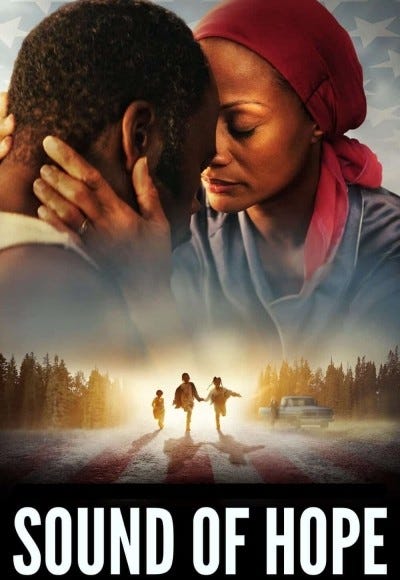Movie Review: Sound of Hope
More messaging from Angel Studios threatens their artistic integrity.
Sound of Hope: The Story of Possum Trot is directed by Joshua Weigel, co-written with his wife, Rebekah, and released by Angel Studios. It’s based on a true story. Judging by its title, I suspect it is meant to be a spiritual sequel to last year's surprise hit Sound of Freedom. This is also supported by the fact that Hope deals in the same subject matter: helping children.
Does it live up to its predecessor? Has Angel Studios captured lightning twice? According to the box office numbers, no. Sound of Hope fell way short of Freedom. But it’s not a bad film.
Donna Martin (Nika King) struggles to keep her family together. That her son, Princeton (Taj Johnson), is severely disabled doesn’t help. When Donna’s mother dies, she nearly breaks down. In the darkness of despair, she has a moment of clarity as she watches children play. Inspired by the sight, Donna decides to become a foster parent.
Her husband, the reverend W. C. Martin (Demetrius Grosse), is skeptical at first - after all, they are barely managing with the two kids they have. However, after learning the terrible situations these kids come from and the inability of child services to deal with them, he becomes Donna’s rock, an ardent supporter of her cause. Together, the Martins inspire 22 families in Possum Trot, Texas, to adopt 77 children.
This story is a tearjerker, for sure, and it’s not afraid to get gritty. In one scene a baby screams as an unknown man beats its mother. A sibling cries on the phone with a 911 operator, “Help my Momma!” Shots ring out. The mother drops like a sack. A few stray bullets narrowly miss the child.
Less violent but no less poignant is the Martins’ financial destitution. All those extra children put a strain on the family budget. We see their bank register indicating about $200 is all that remains in the account. There is a shot of a bill for a greater amount. W. C. is palpably concerned, but the moment is interrupted by a playful Terri (Diaana Babnicova), reminding him - and us - what it’s all for.
These moments are balanced by some every day, real-life moments that sometimes rise to the level of comedy. W. C. is trying to be romantic with his wife. He puts on cheesy music and starts reading bible verses: “Your waist is a mound of wheat.” Which Donna takes, in good humor, to mean she’s fat.
Our leads play off each other well. The above-described scene is the best of many such interactions that endear the characters to us. The child actors do a serviceable job, too.
The only complaint from a film-making point of view is the overuse of voice-over. I am firmly in the Hitchcockian camp that movies are meant to be told visually. Why did the actor say, for example, “I’m happy” when the actor could show his happiness through actions or expressions? Much of the VO in Sound of Hope tells us what should have been shown to us. Its near-constant presence grates on the nerves after some time.
Like its predecessor Sound of Hope includes a mid-credits appeal to get involved and buy tickets for others. It’s preachy and … I’m not sure what else. I like what Angel Studios is doing. The Angel Guild must approve every project. This takes creative control out of a select few Hollywood producers and executives and puts it into the hands of artists and everyday people. Their films, therefore, are more artistic and well-crafted, generally speaking. But their insistence on preaching a message worries me. It’s not okay when Disney does it, and it’s not okay when Angel does it. Films should be about entertainment and art, not activism. When the message overrides the art, you lose your integrity.
Even so, I liked Sound of Hope. It’s good, not great, but worth a watch.




